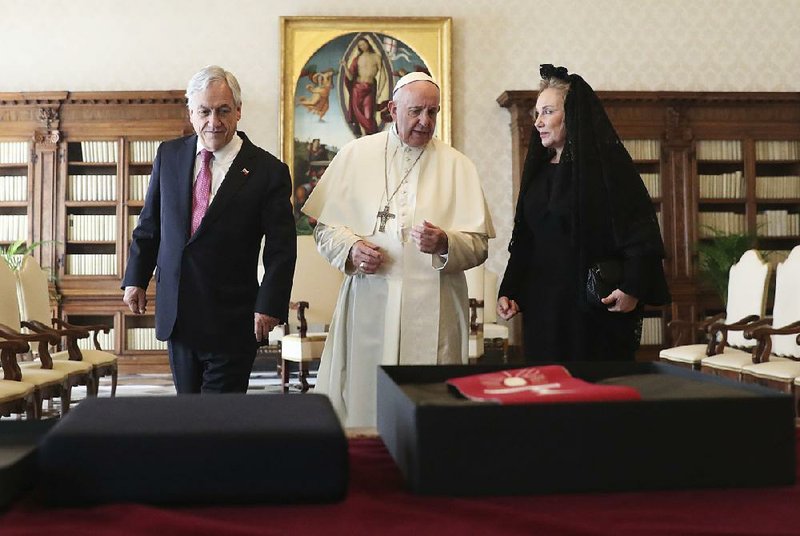VATICAN CITY -- Pope Francis on Saturday defrocked two more Chilean bishops accused of sexually abusing minors, and to show greater transparency about how he's responding to the church's global sex abuse crisis, he publicly explained why they were removed.
The statement said retired Archbishop Francisco Jose Cox Huneeus and retired Bishop Marco Antonio Ordenes Fernandez were defrocked for abusing minors with evidence so overwhelming that a canonical trial was unnecessary. The Vatican said the decision cannot be appealed.
Cox, 87 and suffering from dementia, is a member of the Schoenstatt religious order and had served as a bishop in Chillan, Chile before becoming the No. 2 official at the Vatican's Pontifical Council for the Family, a high-profile position during St. John Paul II's papacy.
He returned to Chile and became bishop in La Serena until he left in 1997 under unclear circumstances, but took on administrative jobs in Rome and at the Latin American bishops' conference in Colombia.
In 2002, the Vatican office for bishops asked the Schoenstatt Fathers to take him in one of its houses, apparently because of abuse allegations. He has been living in Germany since then, but last year a new, formal accusation was received by the Vatican about an alleged case of abuse that happened in Germany in 2004.
The Schoenstatt Fathers said Saturday that the Vatican had asked that Cox remain in their custody. The order said it would cooperate with the justice system, given that victims in Chile have made criminal complaints against him.
Ordenes Fernandez, 53, was made bishop of Iquique, in northern Chile, in 2006 at the young age of 42. He retired six years later reportedly for health reasons. But subsequently allegations of abuse were leveled against him.
Previously, the Vatican has rarely, if ever, announced laicizations of individual priests and only issued a single-line statement if a bishop had resigned, without further explanation.
Before Francis' papacy began in 2013, it was Vatican practice to reveal if resignations were retirements because of age, or for some other "grave" reason that made them unfit for office. But Francis early on removed even that minimum amount of information.
Advocates for abuse survivors have long complained about the Vatican's secrecy in handling such abuse cases and the lack of transparency when the Vatican arrived at judgments.
Vatican spokesman Greg Burke said Saturday's more detailed statement suggested a new trend in the way the Vatican will announce the results of investigations of bishops accused of abuse. A similarly detailed statement was issued when Francis defrocked Chile's most notorious abuser, the Rev. Fernando Karadima, several weeks ago.
Francis has been under fire for his handling of abuse cases for years, but the issue now is threatening his credibility and his legacy. The church's abuse scandal has exploded anew in the U.S., Chile, Germany and elsewhere.
In May, all active bishops in Chile offered to resign over their collective mishandling of the abuse scandal. So far, Francis has accepted the resignations of seven.
Francis discussed the issue during his Vatican audience Saturday with Chilean President Sebastian Pinera Echenique, who also met with the Vatican secretary of state, Cardinal Pietro Parolin.
The Vatican said both meetings discussed "the painful scourge of abuse of minors, reiterating the effort of all in collaboration to combat and prevent the perpetration of such crimes and their concealment."
Chilean survivors of abuse applauded the defrockings, saying the two bishops had used their power to abuse children and had gotten away with it.
A group of lay Catholics from Cox's old diocese in La Serena said they hoped he would be extradited to face justice in Chile, saying he had abused children as young as age 5.
"We want to let it be known that the Schoenstatt order has in its hands a criminal, a predator," who should be "judged and punished like any other delinquent," said Juan Rojas, a spokesman for the John XXIII lay group of La Serena.
Chilean abuse victim Juan Carlos Cruz, who has long denounced the abuse cover-up orchestrated by the highest echelons of the Chilean church, said the "circle was getting tighter" around Cardinal Javier Errazuriz, the retired archbishop of Santiago who is a member of Cox's order.
Francis is under pressure to distance himself from Errazuriz, who remains a member of his Cabinet of nine cardinal advisers.
Information for this article was contributed by Patricia Luna of The Associated Press.
A Section on 10/14/2018
